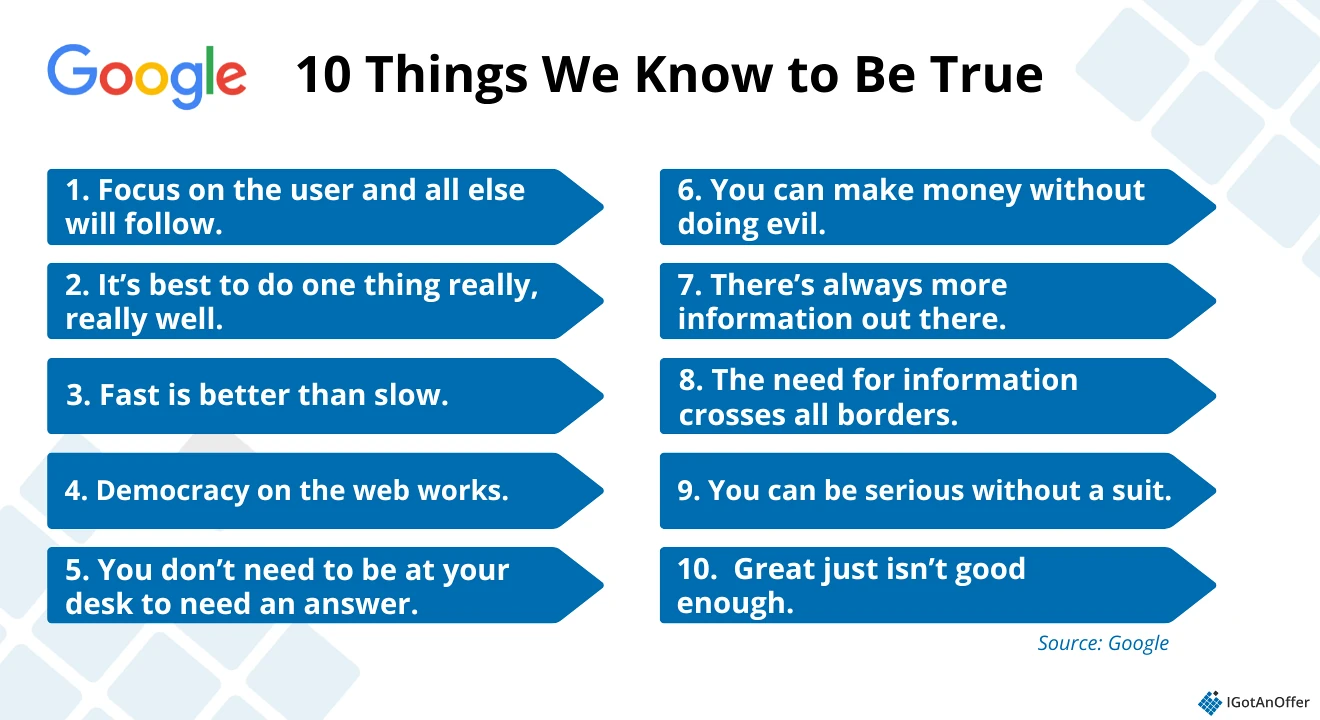If you're applying for a job at Google, you'll need to convince the interviewers that you've got two key traits: "Googleyness" (sometimes spelled "Googliness") and leadership.
In this article, we'll explain what Google means by “Googleyness” and leadership, and show you how you can demonstrate them both during the Google interview process.
Here's what we'll cover:
- What is Googleyness?
- How to demonstrate Googleyness
- How to demonstrate leadership
- Googleyness & leadership interview questions
- How to prepare for your Google interviews
Right, let's get started.
Click here to practice mock interviews with ex-Google interview coaches
1. What is Googleyness?
“Googleyness” is a shorthand way of talking about the attitudes and character traits that Google wants its employees to have.
As a candidate, you’re probably asking: “okay, so what are these attitudes?” And you can easily spend hours online reading various articles, each with a slightly different definition of what Googleyness is, from people who may not have even worked at Google.
Instead, we spent a lot of time researching what Google says about Googleyness. We found that, according to Google, Googleyness is:
- Being comfortable with ambiguity
- Being humble and valuing feedback
- Having a bias for action
- Doing the right thing
- Taking ownership
- Having high standards and dreaming big
- Thinking freely
- Enjoying fun
We created this list using the input of five Google publications on Googleyness. Let’s go through each one now (or skip straight to section 2 to learn how to demonstrate Googleyness).
1.1 Official Google interview preparation pack
In an interview preparation pack that it sends to Google PM candidates, Google says that Googleyness is about finding employees who:
“...dream of the next moonshot idea, thrive in ambiguity, value feedback, effectively challenge the status quo, and do the right thing.”
It goes on to say that candidates should find out more about “what it means to be Googley by reading Google’s corporate philosophy and the Google Values. Additional reading on Google’s culture from our previous SVP of HR Laszlo Bock: Work Rules!: Insights from Inside Google That Will Transform How You Live and Lead."
1.2 Google’s corporate philosophy: “Ten things we know to be true.”

Google wants employees to internalize its corporate philosophy, and it recommends that these ten things we know to be true will help you understand Googleyness.
This is the list in headline form:
- Focus on the user and all else will follow.
- It’s best to do one thing really, really well.
- Fast is better than slow.
- Democracy on the web works.
- You don’t need to be at your desk to need an answer.
- You can make money without doing evil.
- There’s always more information out there.
- The need for information crosses all borders.
- You can be serious without a suit.
- Great just isn’t good enough.
However, this list is very much focused on the company and many of the points aren’t directly relevant for a candidate trying to understand how to be Googly (though you should still read and digest them all anyway).
Most useful is probably the last point, “Great just isn’t good enough”. It talks about how Google employees must be comfortable setting ambitious goals and improving things in unexpected ways.
1.3 Google values
We recommend you take a look at this page to get a sense of the issues that Google thinks are important, and to understand what “Do the right thing” actually means.
At the time of writing there is a clear focus on inclusivity, protecting users and corporate responsibility.
This is all relevant to “Googleyness” and we recommend that you present yourself as someone who understands the importance of these issues.
1.4 Lazlo Block on Googleyness
The book that Google links to in the information pack is from Lazlo Block (ex-Google HR SVP). His 2015 book “Work Rules!” contains a much-quoted explanation of “Googleyness”. He describes it as:
“Attributes like enjoying fun (who doesn’t), a certain dose of intellectual humility (it’s hard to learn if you can’t admit that you might be wrong), a strong measure of conscientiousness (we want owners, not employees), comfort with ambiguity (we don’t know how our business will evolve, and navigating Google internally requires dealing with a lot of ambiguity), and evidence that you’ve taken some courageous or interesting paths in your life.”
Lazlo led Google's human resources for over ten years so his take on Googleyness comes with a lot of authority. We added "Enjoying fun" to our summary above because Lazlo includes it first, although it's not mentioned in the other Google sources we found.
1.5 Google Careers video
Finally, we found another official source on Googleyness. In this Google Careers video, the Google recruiters say that they look for three things to test if someone has Googleyness:
- comfort with ambiguity
- a collaborative nature
- bias to action
These videos are not made on a whim, so it’s fair to say that these three qualities are probably the three most important aspects of Googleyness.
1.6 Is Googleyness the same as “culture fit?”
Googleyness used to be talked about in terms of “culture fit”: will you fit into the culture at Google?
However, Google has tried to change the framing of this in order to discourage bias. Requiring candidates to “fit-in” could lead to exclusion and encourage interviewers to simply hire candidates who are similar to them.
Instead, interviewers are asked to think about “culture add”. Will this candidate bring attitudes and character traits that will be a positive addition to Google’s working culture?
1.7 Is it “Googleyness” or “Googliness”?
It’s spelled “Googleyness”. This is the spelling Google itself uses on company documents, although since it’s a made up word there are probably plenty of Googlers who spell it “Googliness” so it doesn’t really matter.
2. How to demonstrate Googleyness
Depending on your role and the Google office you interview at, you may or may not have an interview round explicitly titled “Googleyness and Leadership”.
But even if you don’t, you’ll still want to demonstrate both these qualities during your other interview rounds, especially behavioral rounds.
Let’s go through the qualities that summarize Googleyness and look at how you can demonstrate them in an interview context.
- Being comfortable with ambiguity
- Being humble and valuing feedback
- Having a bias for action
- Doing the right thing
- Taking ownership
- Having high standards and dreaming big
- Thinking freely
- Enjoying fun
2.1 Being comfortable with ambiguity
This is perhaps the most important aspect of Googleyness and you’ll have plenty of opportunities to show you can deal with ambiguity in your interviews. If you’re an engineer, expect ambiguity in your system design rounds. If you’re a product manager, product design or product strategy questions will be extremely open and ambiguous.
Whatever your role, practice answering typical Google interview questions to get used to thinking of which clarification questions to ask and making decisions despite not having all the information.
2.2 Being humble and valuing feedback
This should be fairly straightforward to demonstrate in your interviews. Listen carefully to when the interviewer challenges you on an answer or suggests another way of approaching the problem. Using the interviewer's input in the right way will show you can work collaboratively and react to feedback.
This is also a tone and “vibe” thing. Be polite and friendly to everyone you come across in the interview process and make them feel that you appreciate their time.
2.3 Having a bias for action
The place to show a bias for action is when you’re answering behavioral questions. Prepare stories that demonstrate that show you taking the initiative or dealing comfortably with necessary risks.
2.4 Doing the right thing
You’ll want to show that you respect Google’s values and philosophy as discussed in section 1. So if an ethical consideration comes up in an interview, err on the side of being inclusive, protecting privacy, being environmentally friendly, etc.
2.5 Taking ownership
You can demonstrate ownership in any interview round by showing confidence in making decisions but proactively taking responsibility for any mistakes.
Enthusiasm and passion helps here too. Showing a passion for Google, its products and the problems you’ll work through with your interviewer will convey to them that you’re emotionally invested in the company and will act like an owner, rather than a mere employee.
2.6 Having high standards and dreaming big
In the 2014 Founders' IPO letter, Sergey Brin writes that “Talented people are attracted to Google because we empower them to change the world.”
With that in mind, show your interviewers that you can come up with those “mooonshot” ideas, that you’re excited to work to really high standards, and that you really care about the impact of the products you’ll be working on.
2.7 Thinking freely
In the sources we listed in section 1, Google says that Googleyness means being willing “challenging the status quo”, while Lazlo Block describes wanting to see "evidence that you’ve taken some courageous or interesting paths in your life.”
This is because in order to keep innovating and continue to be a leader in its fields, Google needs employees who can think outside the box.
For behavioral questions, prepare some stories from your past where you solved a problem creatively or took an unusual decision that paid off.
In other rounds, especially in ones where you get hypothetical questions, try to display some creativity and free thinking in your answers, where possible. This may mean being ready to deviate from your answer framework in order to go down an interesting rabbit hole with your interviewer.
2.8 Enjoying fun
It's become a cliché, but in the early 2000s it seemed brave and exciting that a company would put ping pong and air hockey tables in its offices. This element of "fun" is part of Google's brand identity and is part of what has helped them recruit the best talent.
That's why Google is less likely than Amazon, for example, to hire tough, super-demanding managers. Google focuses more on collaboration and wants the workplace to be a fun place, albeit with very high standards.
With this in mind, show that you understand that fun and high standards are not mutually exclusive. If you're managing a team, explain how you'll motivate them in a positive way rather than burning them out.
3. How to demonstrate leadership in a Google interview
Of course, “Leadership” isn’t as ambiguous a phrase as “Googleyness”. However, it’s worth taking a moment to consider exactly what Google means when it talks about leadership.
“They lead and influence effectively, manage projects, get things done, work as a team, and strive for self development." (from Google PM prep pack).
Let’s zoom in on those five qualities there and look at how you can demonstrate them:
1. Leading and influencing effectively:
If you’re a manager, you’ll need to show your interviewers that you understand the users of your product and that you can formulate a team mission (see video below). Think about these things carefully in the context of your current and previous roles, and be prepared to talk about them convincingly.
If you’re not applying for a management role, you’ll still want to show that you can have the ability to influence people. Prepare stories from your past experience where you took the lead in a team environment and successfully led colleagues towards a successful outcome.
2. Managing projects:
Even a junior SWE will need to manage projects from time to time, even if just in a team. So expect some questions around project management and be ready to show that you can put processes in place to work effectively and efficiently.
3. Getting things done:
At its basest level, leadership is about getting things done. Google careers pages often mention wanting to hire people who have a bias for action. People who make things happen rather than wait for others to take the lead. Prepare stories about your past experience that show you doing taking the initiative and delivering results.
4. Working as a team:
From Google’s perspective, part of leadership is knowing how to work as a team, solving conflicts, listening to others and enabling them to do their best possible work.
You won’t always be the most knowledgeable person in the room, so you’ll need to seek out expertise elsewhere. From this perspective, leadership should be a collaborative process, rather than top-down.
Interview questions about collaboration are almost guaranteed, so prepare some solid stories about past collaborative efforts.
5. Striving for self-development:
As a company, Google has always been fairly pioneering in giving its employees a greater amount of autonomy than the norm. In return, Googlers are expected to have a strong self-improvement mindset and to make the most of the excellent learning opportunities in the company.
Talk about what you’ve learned in your current role and what you’d love to learn at Google. Think about the books, websites, YouTube channels, etc. that inspire you and teach you things and be ready to talk about them if it feels appropriate.
For further insight into how Google sees leadership, we recommend you watch this video from their careers page.
4. Googleyness and leadership interview questions
As we said above, Google will use behavioral questions to test you for Googleyness and leadership.
We’ve analyzed hundreds of Google interview reports on Glassdoor.com to find the most typical examples of Googleyness and leadership questions.
Let’s take a look.
Googleyness interview questions at Google
- Why Google?
- Tell me about yourself
- Tell me about a challenge or conflict you faced at your past/current job. How did you handle it?
- Tell me about a time you had to change
- Tell me about a time when you had to come up with a creative solution to solve a problem.
- Tell me about a time you created something from nothing
- Tell me about your biggest achievements in your past work
- Tell me about the last time you failed, and what happened
- Tell me about your favorite Google product
- Why this position?
- Where do you see your career moving?
- Why are you leaving your former position?
- What are your strengths and weaknesses?
- What makes a good [job title]? What makes a bad [job title]?
- If you had coffee with Sundar Pichai what would you talk to him about?
Leadership interview questions at Google
- Tell me about a time you demonstrated leadership even though you weren't the formal manager
- Tell me about a time you led a team through a difficult situation
- Tell me about a time you developed and retained team members
- Tell me about a time you had to handle trade offs and ambiguity
- Which traits differentiate a manager from a leader, and how do you rank yourself as a leader on those traits?
- How would you deal with a team challenge in a balanced way?
- How would you address a skill gap or personality conflict?
- How would you ensure your team is diverse and inclusive?
- Tell me about a time you were the end-to-end owner of a project
- Tell me about a time you improved a process at one of your previous workplace
We recommend using the SPSIL method to answer these questions, as explained in our Google behavioral interview questions guide.
5. How to prep for your Google interview
We've coached more than 15,000 people for interviews since 2018. There are essentially three activities you can do to practice for Google interviews. Here’s what we've learned about each of them.
5.1 Learn by yourself
Learning by yourself is an essential first step. You’ll want to deep-dive into more information specific to the role you’re targeting. To do this, check out one of our Google interview guides below:
- Google product manager
- Google associate product manager
- Google product marketing manager
- Google program manager
- Google technical program manager
- Google software engineer
- Google engineering manager
- Google system design interviews
- Google data scientist
- Google (technical) account manager
- Google machine learning engineer
- Google data engineer
- Google site reliability engineer
- Google strategy and operations
- Google L4 engineer
Once you’re in command of the subject matter, you’ll want to practice answering questions. But by yourself, you can’t simulate thinking on your feet or the pressure of performing in front of a stranger. Plus, there are no unexpected follow-up questions and no feedback.
That’s why many candidates try to practice with friends or peers.
5.2 Practice with peers
If you have friends or peers who can do mock interviews with you, that's an option worth trying. It’s free, but be warned, you may come up against the following problems:
- It’s hard to know if the feedback you get is accurate
- They’re unlikely to have insider knowledge of interviews at your target company
- On peer platforms, people often waste your time by not showing up
For those reasons, many candidates skip peer mock interviews and go straight to mock interviews with an expert.
5.3 Practice with experienced Google interviewers
In our experience, practicing real interviews with experts who can give you company-specific feedback makes a huge difference.
Find a Google interview coach so you can:
- Test yourself under real interview conditions
- Get accurate feedback from a real expert
- Build your confidence
- Get company-specific insights
- Learn how to tell the right stories, better.
- Save time by focusing your preparation
Landing a job at a big tech company often results in a $50,000 per year or more increase in total compensation. In our experience, three or four coaching sessions worth ~$500 make a significant difference in your ability to land the job. That’s an ROI of 100x!















